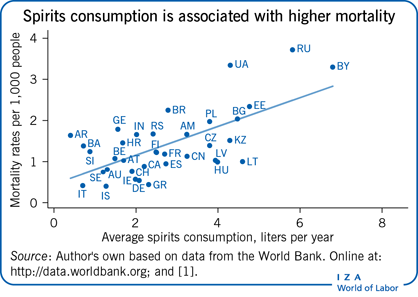Elevator pitch
Eastern European countries, particularly former Soviet Union economies, traditionally have the highest rates of alcohol consumption in the world. Consequently, they also have some of the highest male mortality rates in the world. Regulation can be effective in significantly decreasing excessive drinking and its related negative effects, such as low labor productivity and high rates of mortality. Understanding the consequences of specific regulatory measures and what tools should be used to combat excessive alcohol consumption is essential for designing effective policies.
Key findings
Pros
Price regulation in the market for alcohol has a significant effect on alcohol consumption.
Lowering levels of excessive drinking improves personal health and labor productivity (for men) and brings down mortality rates.
When there are constraints to policy, measures to promote the substitution of spirits for less harmful drinks have a positive effect.
The presence of peer effects multiplies the effectiveness of policy.
Policy that targets young adults can be particularly effective in preventing habitual alcohol consumption from developing.
Cons
Strict regulation may be politically costly, particularly for populist politicians.
Strict regulation may cause people to switch to homemade and surrogate alcohol, which can have even more harmful effects.
No studies have been conducted on the causal effect of an increase in the price of alcohol on the consumption of homemade and surrogate alcohol.
Establishing the causal effect of excessive drinking on mortality is difficult.
There is mixed evidence of a causal effect of excessive drinking on labor productivity for women.
